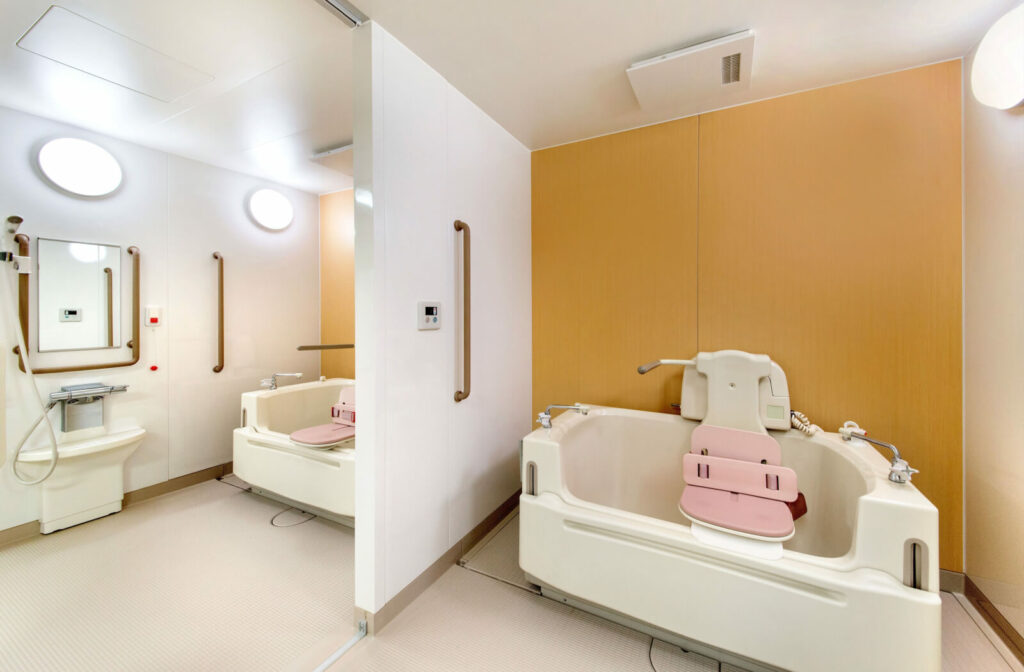Bathing is just one way you might help a loved one with dementia, but it can also be a challenging task for caregivers. Resistance, confusion, and physical limitations can make what might seem like a simple task feel complicated and overwhelming. However, with patience, empathy, and the right strategies, you can make bathing a more comfortable experience for both you and your loved one.
Here are some of the strategies that our staff at the Fairways at Naples use to make bathing more comfortable for our memory care residents:
- Creating a calm environment
- Establishing a routine
- Communicating clearly and gently
- Keeping bathing short and simple
- Using bathing aids
- Respecting your loved one’s dignity and privacy
- Being patient and positive
- Seeking professional help if needed
Understanding the Challenges
Caring for someone with dementia comes with its unique set of challenges, especially when it comes to personal hygiene. Here are some common issues you might face:
- Resistance to Bathing: Fear, confusion, or simply not understanding what is happening can cause your loved one to resist bathing.
- Difficulty Maintaining Hygiene: Memory loss and difficulties with following instructions can make it hard for your loved one to keep up with personal care.
- Lack of Recognition of Need: Your loved one may not recognize the need for bathing, leading to them refusing to have baths.
- Physical Challenges: Assisting someone who has difficulty standing or moving can be physically demanding.
- Emotional Distress: Bathing can cause emotional distress for both the person with dementia and the caregiver. In the most severe cases, you may need to delay the bath until later and allow your loved one to calm down enough for them to bathe safely.
Tips for Making Bathing Easier
Prepare the Bathroom in Advance
Having necessities like towels, a chair, soap, and shampoo in place beforehand will make the experience less stressful and allow you to focus on helping your loved one. The most important part of this step is to make sure the bathroom is safe for your loved one. You may also find it useful to prepare soothing activities, such as relaxing music or being able to sing together.
Establish a Routine
Routine is important for individuals with dementia. Try to bathe your loved one at the same time each day to create a sense of predictability. This can help reduce resistance as they become accustomed to the routine.
Communicate Clearly and Gently
Use simple, clear instructions and speak in a calm, reassuring tone. Explain each step of the process, and be patient if your loved one doesn’t understand right away. Avoid rushing them at any point, and give them time to process your instructions. If needed, you can also use the “watch-me” technique to demonstrate how your loved one should wash themselves.
Keep It Short and Simple
The bathing process doesn’t need to be long and elaborate. A quick sponge bath can sometimes be enough. Focus on essential areas like the face, underarms, and genital area if a full bath is too overwhelming. You may also decide to bathe different parts of the body on different days, or to bathe the body on one day and shampoo hair on another.
Use Bathing Aids
There are many aids available that can make bathing easier and safer. Non-slip mats, hand-held showerheads, and shower chairs can provide support and reduce the risk of falls. Consider using these aids to make the process more manageable.
Respect Their Dignity and Privacy
Always respect your loved one’s dignity and privacy. Cover them with a towel or a bathrobe as much as possible during the process. Allow them to do as much as they can independently, even if it takes longer.
Be Patient and Positive
Patience is key when helping someone with dementia bathe. Stay positive and offer praise and encouragement throughout the process. A positive attitude can help reduce stress and make the experience more pleasant for both of you.
Seek Professional Help If Needed
If bathing becomes too difficult or stressful, consider seeking help from a professional caregiver or a visiting nurse. They can provide assistance and relieve some of the burden from you. The respite care program at Fairways at Naples is designed to provide an enjoyable short-term stay for seniors so their caregivers can have a break.
We’re Here to Help
Helping someone with dementia bathe is a delicate task that requires understanding, patience, and empathy. By creating a calm environment, establishing a routine, and using the right tools, you can make the process smoother and more comfortable for your loved one. Remember, it’s okay to ask for help if you need it.
Whatever challenges you and your loved ones face, The Fairways at Naples is committed to helping you provide them with the best possible quality of life. For more information on how we can help, contact us today!

